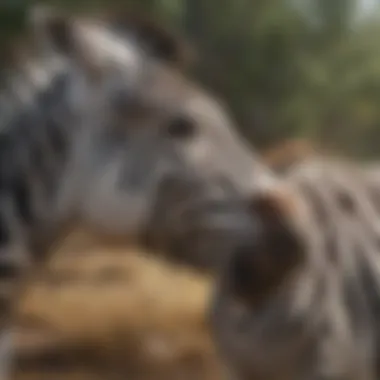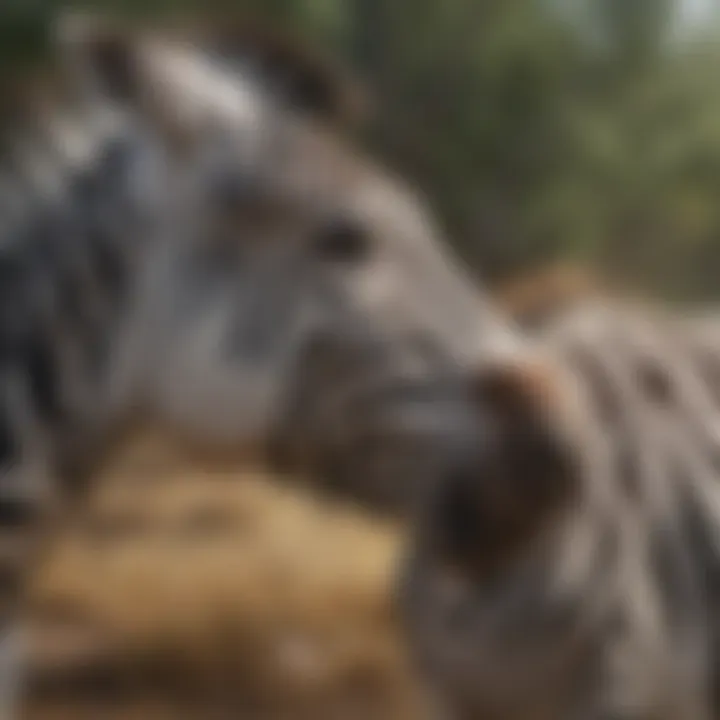Unraveling the Intricacies of Sapolsky's Insights on Why Zebras Don't Get Ulcers: A Comprehensive Analysis


Book Title and Author Introduction
Robert Sapolsky's 'Why Zebras Don't Get Ulcers' is a seminal work that intersects biology and stress psychology, offering profound insights into stress responses across species. Sapolsky, a distinguished neurobiologist and primatologist, brings a unique perspective to the discussion, blending scientific rigor with a compelling narrative. The book delves into the complexities of stress, exploring how our evolutionary past influences our present-day reactions to stressors.
Summary of Book Content
Sapolsky's book meticulously dissects the physiological and psychological mechanisms that underpin stress responses. He eloquently articulates how stress impacts our bodies at cellular levels and delves into the intricacies of stress-related diseases. Through vivid examples and scientific evidence, Sapolsky intricately weaves together the threads of biology, behavior, and stress, offering readers a comprehensive understanding of the topic. One of the notable quotes that encapsulates the essence of the book is, 'Stress is not a state of mind it's about your body preparing for action.'
Three Lessons Learned
- Lesson 1: Stress Response Mechanisms - Sapolsky elucidates how our bodies react to stress, unveiling the intricate cascade of physiological responses that occur in the face of a stressor. Understanding these mechanisms allows us to grasp the profound impact of stress on our overall well-being.
- Lesson 2: Behavioral Coping Strategies - The book explores various coping mechanisms animals and humans employ to mitigate stress. From social bonding to engaging in pleasurable activities, Sapolsky highlights the importance of adaptive behaviors in buffering the effects of stress.
- Lesson 3: Long-term Health Consequences - Sapolsky discusses the lasting impact of chronic stress on health, shedding light on how prolonged exposure to stress hormones can contribute to a range of illnesses, from heart disease to mental health disorders.
Practical Applications
In real-life scenarios, the lessons from Sapolsky's book can be applied in diverse settings. For instance, recognizing one's stress triggers and implementing stress-reduction techniques can enhance overall well-being. Practicing mindfulness, engaging in physical exercise, and fostering social connections are practical ways to implement the lessons learned in daily life, promoting resilience in the face of stress.
Introduction to Stress and its Effects
Stress is a fundamental aspect of human and animal life, intricately woven into the fabric of our biology and behavior. In this article, we embark on a journey to unravel the complexities of stress and its effects, drawing insights from the remarkable work of Robert Sapolsky in 'Why Zebras Don't Get Ulcers.' By delving into this topic, we aim to dissect how stress influences our health and well-being, shedding light on the symbiotic relationship between our minds and bodies.
Exploring the Concept of Stress
Defining Stress in Biological Context


Delving into the realm of biology, the concept of stress is as intriguing as it is pervasive. In this section, we scrutinize the specific nuances of defining stress within a biological framework. By dissecting the physiological responses to stressors, we unravel the intricate mechanisms that dictate our body's reactions. Understanding this definition is vital for grasping the foundations of stress physiology and its implications for overall health. The unique proposition of this subsection lies in its ability to encapsulate the essence of stress biology with precision and clarity.
Evolutionary Significance of Stress Response
The evolutionary underpinnings of stress responses offer a captivating glimpse into our ancestral past. By exploring the significance of stress responses from an evolutionary lens, we unearth the adaptive nature of stress in enhancing survival instincts. This subsection serves as a beacon illuminating the adaptive advantages conferred by stress responses throughout the course of evolution. Analyzing this aspect provides a nuanced understanding of how stress mechanisms have been fine-tuned over millennia, shaping our biological responses in the face of challenges.
Physiological Responses to Stress
Role of Hypothalamic-Pituitary-Adrenal (HPA) Axis
Central to the orchestration of stress responses is the intricate interplay within the Hypothalamic-Pituitary-Adrenal (HPA) axis. By unraveling the role of this axis in the stress response cascade, we gain insights into how hormones act as messengers, coordinating our body's reaction to stress. Understanding the HPA axis's significance equips us to comprehend the physiological underpinnings of stress and its impact on our well-being. Exploring this aspect sheds light on the delicately balanced hormonal mechanisms that dictate our stress responses.
Impact of Cortisol and Adrenaline
Cortisol and adrenaline, the quintessential stress hormones, play a pivotal role in shaping our physiological responses to stress. This section delves into the profound impact of these hormones on our body's responses, elucidating how they modulate energy metabolism, immune function, and emotional well-being during stressful situations. By dissecting the influence of cortisol and adrenaline, we uncover the intricate ways in which stress hormones sculpt our physiological landscape, preparing us for challenging encounters.
Behavioral Manifestations of Stress
Fight-or-Flight Response
The fight-or-flight response stands as a primal instinct safeguarding individuals in the face of danger. By dissecting this innate response mechanism, we unearth the behavioral manifestations that accompany stress-laden situations. Exploring the intricacies of fight-or-flight sheds light on how our bodies prime themselves for action when confronted with stressors, underscoring the adaptive nature of these behavioral responses. Unpacking this aspect offers a glimpse into the evolutionary heritage that influences our behavioral choices during challenging circumstances.
Psychological Strategies for Coping with Stress
Navigating the realm of psychological strategies for coping with stress unveils a plethora of techniques for managing the psychological toll of stress. By examining coping mechanisms such as mindfulness and relaxation techniques, we delve into how individuals can mitigate the damaging effects of chronic stress on mental well-being. This section serves as a guiding light, offering practical insights into fostering resilience and emotional well-being in the face of stressors.


Insights from Sapolsky's 'Why Zebras Don't Get Ulcers'
Sapolsky's 'Why Zebras Don't Get Ulcers' provides a deep dive into the complexities of stress, biology, and behavior, offering profound insights that are crucial for understanding the impact of stress on both humans and animals. This section serves as the cornerstone of the article, elucidating key concepts that shape our comprehension of stress physiology and its implications on overall health and well-being.
Key Concepts Explored by Sapolsky
Stress as an Adaptive Response
In his analysis, Sapolsky emphasizes the pivotal role of stress as an adaptive mechanism developed through evolution to aid organisms in responding to threats effectively. This intricate exploration sheds light on the evolutionary significance of stress responses, illustrating how they have been finely tuned over time to ensure survival in challenging environments. Understanding stress as an adaptive response is essential in deciphering the underlying mechanisms that dictate our physiological and behavioral reactions to stressors, making it a fundamental component of this article's narrative.
Impact of Chronic Stress on Health
Sapolsky's examination of the impact of chronic stress on health highlights how prolonged exposure to stressors can have detrimental effects on various physiological systems, ultimately leading to a cascade of negative health outcomes. By dissecting the intricate interplay between chronic stress and disease, Sapolsky underscores the critical need to manage and mitigate stress effectively to safeguard one's health. This section delves into the nuanced understanding of how chronic stress manifests in the body and mind, providing valuable insights into the holistic implications of long-term stress on overall well-being.
Neurobiological Mechanisms of Stress Regulation
As Sapolsky delves into the neurobiological underpinnings of stress regulation, he unpicks the complex web of interactions that govern stress hormones and their effects on the body. By exploring the regulation of stress hormones, Sapolsky outlines the intricate feedback mechanisms that enable the body to maintain homeostasis in the face of stressors. This section delves into the intricate balance between cortisol and adrenaline, elucidating how these hormones influence our physiological responses to stress and shape our overall health outcomes. Additionally, the exploration of the effects of prolonged glucocorticoid exposure sheds light on the long-term consequences of dysregulated stress hormone levels on various bodily functions, offering a comprehensive overview of the neurobiological repercussions of chronic stress.
Psychological Factors Influencing Stress Resilience
Sapolsky's discussion on psychological factors influencing stress resilience underscores the crucial role of cognition and social support in mitigating the negative effects of stress on health. By examining the perception of control and predictability, Sapolsky delves into how individuals' beliefs about their ability to influence outcomes can modulate their stress responses, highlighting the intertwined nature of mindset and stress resilience. Furthermore, the exploration of social support and stress buffering elucidates how interpersonal relationships and community ties can serve as protective factors against the deleterious effects of stress, emphasizing the importance of a strong support network in coping with life's challenges. This section elucidates the profound impact of psychological factors on stress coping strategies, providing invaluable insights into the intertwined nature of mental well-being and stress resilience.
Implications for Health and Well-Being


When delving into the "Implications for Health and Well-Being" in the context of Sapolsky's work on stress and biology, it becomes evident that understanding the impact of stress on human health is crucial. Stress has been linked to various health issues, including cardiovascular problems and compromised immune function. By exploring these implications, we can gain insights into how stress affects our overall well-being and the importance of adopting strategies to manage it effectively.
Link Between Stress and Disease
Cardiovascular Health
In the realm of stress and its connection to disease, addressing cardiovascular health is paramount. Stress has been implicated in the development and progression of cardiovascular conditions such as heart disease and hypertension. Understanding how stress impacts the cardiovascular system provides valuable insight into preventative measures and treatment approaches. Highlighting the role of stress in cardiovascular health underscores the significance of managing stress for overall well-being.
Immune Function
Another critical aspect in the link between stress and disease is immune function. Chronic stress has been shown to weaken the immune system, increasing susceptibility to infections and other illnesses. Exploring the relationship between stress and immune function sheds light on the intricate mechanisms by which stress compromises our body's defense system. Recognizing the impact of stress on immunity underscores the importance of stress management in maintaining optimal health.
Strategies for Managing Stress
Mindfulness and Meditation
In the realm of stress management, mindfulness and meditation have garnered attention for their effectiveness in reducing stress levels. These practices promote present-moment awareness and relaxation, helping individuals cope with stress more effectively. By incorporating mindfulness and meditation into daily routines, individuals can enhance their resilience to stressors and improve overall well-being.
Physical Exercise and Relaxation Techniques
Physical exercise and relaxation techniques play a crucial role in stress management by promoting physical health and emotional well-being. Engaging in regular exercise not only helps alleviate stress but also enhances mood and cognitive function. Incorporating relaxation techniques such as deep breathing and progressive muscle relaxation offers individuals effective tools to combat stress and promote holistic health.
Role of Resilience in Stress Coping
Building Emotional Resilience
Building emotional resilience is key to effectively coping with stress and adversity. Emotional resilience equips individuals with the capacity to bounce back from challenges and maintain a positive outlook in the face of stressors. By fostering emotional resilience through self-awareness and adaptive coping strategies, individuals can navigate stress more adeptly and safeguard their mental health.
Adaptive Coping Strategies
Adaptive coping strategies play a vital role in stress management by enabling individuals to respond to stress in a constructive manner. These strategies involve problem-solving, seeking social support, and employing cognitive reframing techniques to cope with stressors effectively. Emphasizing the importance of adaptive coping strategies underscores their relevance in promoting resilience and well-being amidst challenging circumstances.







